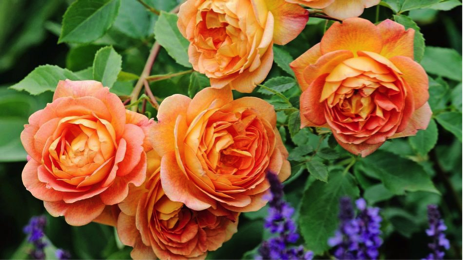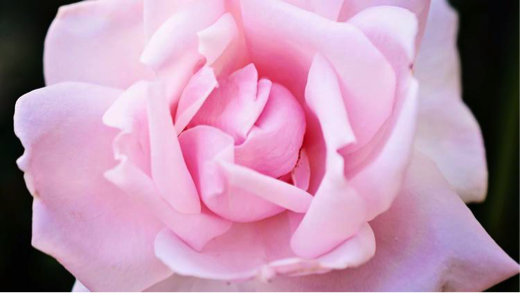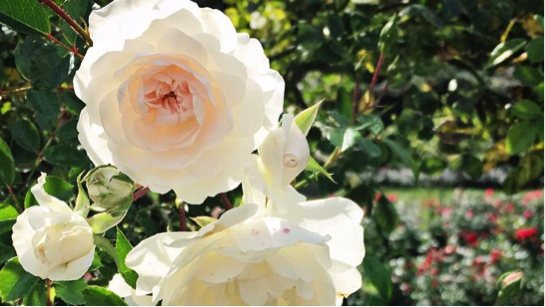Hybridizers busy perfecting easy, hardy roses
By Rita Perwich

The chalice-shaped apricot blooms of Lady of Shallot are fragrant. This rose is highly resistant to disease and blooms continually throughout the year. (David Austin Roses)
Most gardeners today want to grow roses with less effort and without the use of pesticides and fungicides. For our own health and the well-being of our environment, we know we should adopt sustainable practices in our gardens, and so we have been demanding roses that are disease resistant, easy to grow, low maintenance and environmentally friendly. In recent years, the rose industry and many rose hybridizers are concentrating their efforts on producing the roses we are seeking. Two wonderful resources are available to us when we search for unbiased recommendations for roses of merit. Both Texas A&M and Earth-Kind Roses have been testing roses, and their research helps us find trouble-free and healthy roses for our gardens, which translates into more relaxation time for us!
The Earth-Kind rose research project was created by horticultural specialists in the Texas AgriLife Extension Service to identify roses that are beautiful, healthy, productive landscape plants despite needing almost no care. Roses are evaluated for four years in regional field trials at seven universities. Rose cultivars, growing on their own roots, must be attractive and possess an extremely high level of landscape performance, coupled with outstanding disease and insect tolerance and/or resistance in order to receive the prestigious horticultural designation of Earth-Kind. The roses are not fed with synthetic commercial fertilizers or sprayed with pesticides or fungicides, and they are also only very lightly pruned. The planting beds are cleaned and well-amended with compost before the roses are planted, and they are topped with 3 inches of mulch after planting. Irrigation is supplied freely by drip for the first year the roses are getting established, with less water in the second year and during the final two years, irrigation is applied only in case of extreme drought.

New Dawn, introduced in 1930, is one of the older roses that have earned the Earth-Kind designation. It is a vigorous, 15- to 20-foot climber with fragrant blush pink double blossoms. (Rita Perwich)
Some modern floribunda roses with Earth-Kind designation include Blue for You, Desmond Tutu, Easy Does It, Koko Loco, Plum Perfect and Poseidon. Hybrid tea roses with the designation include Beverly (which is very fragrant), Savannah, South Africa and Wedding Bells. Older roses with the Earth-Kind designation include the fragrant tea rose Mrs. Dudley Cross (a Peace rose look-alike), Monsieur Tillier, Cécile Brünner, Mutabilis, New Dawn, Duchesse de Brabant, Else Poulsen, The Fairy and Sea Foam. Further information about Earth-Kind, including photographs of the roses, can be accessed at aggie-horticulture.tamu.edu/earthkindroses. In 2012, American Garden Rose Selections (AGRS), a nonprofit organization, replaced the old All-America Rose Selections (AARS). It was founded to provide a national rose testing service for the best garden-worthy rose varieties for the average gardener. AGRS evaluates four plants of each test variety for two years in 12 trial gardens located in six regions.
With respect to the environment, the AGRS motto is “Do no harm.” Its stated aims are to conserve water, to fertilize only moderately, to cultivate as lightly as needed and to avoid applying synthetic chemical sprays except for critical conditions that could jeopardize the well-being of the entire garden. The scoring system is heavily weighted for disease resistance and regional suitability.

Sea Foam, another older rose with the prestigious Earth-Kind designation, is one of the best landscape roses. It has creamy-white double blooms on a vigorous, continually blooming trailing rose, which can be used as a ground cover rose. (Rita Perwich)
The testing gardens evaluate and make recommendations annually regarding roses of recent vintage. Roses are recommended by AGRS only if they thrive under these growing conditions and are also found to be aesthetically pleasing and repeat-blooming. In 2017 there were six AGRS winners. Two of the winners were David Austin English shrub roses: Munstead Wood, a deep crimson multi-petalled rose, and Lady of Shallot, a salmon-pink rose with a cupped form. Another winner was Faith Whittlesey, a Viraraghavan tea rose with bright white cupped flowers. And there were three winners by Bill Radler, the hybridizer of the Knock-Out roses: Icecap, Tahitian Treasure and The Peachy Keen Rose.
For those roses that make the cut, AGRS has a separate award for outstanding fragrance which was received in 2017 by the two David Austin roses, Munstead Wood and Lady of Shallot. In 2016, the AGRS fragrance award went to a Meilland hybrid tea rose, Dee-Lish, a bright pink 35-petal old-fashioned-looking rose with a heavy damask fragrance.
Further information about the AGRS can be accessed on their website at www.americangardenroseselections.com.
One more resource to help you choose roses is our own rose society, the San Diego Rose Society, where local growers are happy to share their personal experiences with rose growing in our San Diego conditions. Knowing which rose to select for our garden can be difficult with so many hundreds of beautiful rose varieties to choose from. The key to success in growing roses is to pick the right roses for our location. When we do that, we are rewarded with a healthy, thriving garden full of rose blooms and more time to relax and enjoy them.
This article first appeared in the San Diego Union-Tribune on November 3, 2017
Perwich is a member of the San Diego Rose Society, a Consulting Rosarian and a Master Gardener with UC Cooperative Extension.

